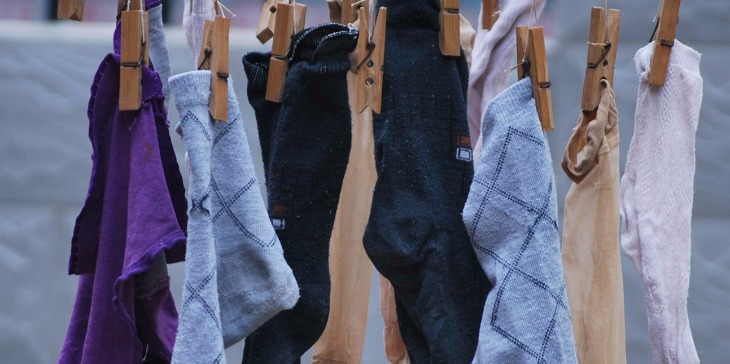 Undated photo by Peter Griffin via
PublicDomainPictures.net, PD
Undated photo by Peter Griffin via
PublicDomainPictures.net, PD
As a mother of a large family, struggling to wash, dry, and fold three or four loads of laundry every day, I secretly wondered if there was an obscure saint, with little to do, who could fill in as my patron saint of missing socks. Little did I know, God was using the dilemma of unpaired socks to purify me because I was trying too hard to be the perfect mother and housekeeper.
This earnest striving was a weakness, not a virtue because my diligence was rooted in insecurity, unbelief but most of all in pride. Again and again, as I read spiritual material, God tried to teach me that true Christianity is not focused on personal perfection but founded on the power of the Cross and Resurrection to set us free.
“We are not the sum of our weaknesses and failures, we are the sum of the Father’s love for us.” -St. Pope John Paul II
“The crucifix does not signify defeat or failure. It reveals to us the Love that overcomes evil and sin.” – Pope Francis“Don’t worry about being effective. Just concentrate on being faithful to the truth.” -- Dorothy Day
In Control
Relying on Myself
There are solutions to the sock problem. Some are outrageous. For example, I remember a crazy, campfire song, from my childhood, that we usually sang in rounds.
“Black socks, they never get dirty;The longer you wear them, the blacker they get.Some times, I think I should wash themBut something keeps telling me
Oh, not yet, not yet, not yet!”
I did not seriously consider this option, though. Socks reek after only one day stuck inside an active child’s running shoe. I had 154 stinky socks to wash every week, at the bare minimum. Oh well, sometimes I did four loads of laundry a day and socks really didn’t take up that much room.
The trouble was, socks seemed to disappear into mountains of clean but unfolded laundry or never made it into the washing machine in the first place. Do you have any idea where 154 socks can hide every week? I had to look between sheets, under the Chesterfield and chairs, behind closet doors, inside wet boots, in school bags, under toy baskets, inside of pant legs and even, if I was lucky, in one of eleven dirty clothes baskets. But, I had to pair them all, or did I? That was the brilliant, out-of-the-box sort of question I asked myself one day. I was sure my intellect had finally solved my problem.
New solution. Buy lots of black socks in every size. Surely some semblance of a pair would be easier to find. I simply tossed the black socks into a wicker basket with a three-foot circumference and a height of two and a half feet and hoped for the best.
However, I had managed to overlook one important fact. I had six daughters. Little girls don’t like black socks. They like pink ones. To make matters worse, my mother bought cute socks with frills and bows and patterns that the girls really needed and loved. None of them were the same. So although I used the toss-and-throw method of pairing, some mornings found us frantically searching through my huge, unpaired sock basket.
At times, I had to literally toss the newly-discovered pair over the upstairs railing. One of my kids, who already had their coat and school bag on their back, would catch them in mid-air. They quickly pulled on their socks, stuffed their feet into boots or shoes and flew out the door, barely making the school bus.
People joke about washing machines eating socks. Rationally, I know this is a silly answer to my dilemma but the more I think about it, the better I like the whimsical answer. I could kill myself trying to control everyone’s bad habits but really, life is much more interesting since I finally relaxed a bit and joked about my failings and foibles. God seems to like those who realize they are failures because then He can finally save them from themselves.
[Tweet "God seems to like those who realize they are failures; He can finally save them from themselves."]
It Is All About Grace
Surrendering to the power of the Holy Spirit within our spirits can seem like a rather esoteric activity, something to talk about, write about, and perhaps pray about but it often is not part of our daily lives. However, our inner and outer lives are intricately entwined. If we depend on our own efforts in our day to day life, we will inevitably think we can earn salvation by praying, attending Mass, confession, and saying the rosary. All these activities place us in God’s presence but they do not justify or sanctify us. As the Catechism of the Catholic Church explains:
Our justification comes from the grace of God. Grace is favor, the free and undeserved help that God gives us to respond to his call to become children of God, adoptive sons, partakers of the divine nature and of eternal life.
This vocation to eternal life is supernatural. It depends entirely on God’s gratuitous initiative, for he alone can reveal and give himself. It surpasses the power of human intellect and will, as that of every other creature.
The grace of Christ is the gratuitous gift that God makes to us of his own life, infused by the Holy Spirit into our soul to heal it of sin and to sanctify it. It is the sanctifying or deifying grace received in Baptism. It is in us the source of the work of sanctification:
Sanctifying grace is an habitual gift, a stable and supernatural disposition that perfects the soul itself to enable it to live with God, to act by his love. Habitual grace, the permanent disposition to live and act in keeping with God’s call, is distinguished from actual graces which refer to God’s interventions, whether at the beginning of conversion or in the course of the work of sanctification.
Forgetting What is Not Essential
Slowly, I learned how to let non-essentials go and centre on loving and receiving love. Maintaining a perfectly clean house with all the laundry folded in dresser drawers was not central to my vocation as a mother, but having time to spend with God and nurture my kids was. The benefit of letting go of control in my daily life was that this attitude of surrender spilled over into my inner life.
Patron Saint of Missing Socks, pray for us, so we receive the grace to surrender to the power of Christ crucified and allow Him to save us.
Copyright 2016 Melanie Jean Juneau
About the Author

Melanie Jean Juneau
Melanie Jean Juneau is a mother of nine children who blogs at joy of nine9. Her writing is humorous and heart-warming; thoughtful and thought-provoking. Part of her call and her witness is to write the truth about children, family, marriage and the sacredness of life. Melanie is the administrator of ACWB, the Editor in Chief at CatholicLane, CatholicStand, Catholic365 , CAPC & author of Echoes of the Divine.


.png?width=1806&height=731&name=CatholicMom_hcfm_logo1_pos_871c_2728c%20(002).png)
Comments